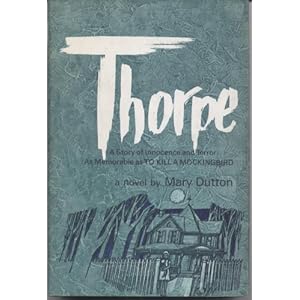
One of my students nearly came unglued when I told her I'd never heard of the book Thorpe by Mary Dutton. The next day this students brought in a tattered green hard-cover book and left it with me without asking how long it'd take me to read it. I wasn't excited about reading the book because I didn't know anything about it-- only that one of my students, who is a prolific reader herself, was adamant that I must read it. She insisted that is was along the lines of To Kill a Mockingbird, but it was better. After a month and a half of letting the book ferment on my counter of random school papers, rubrics and other less-than-urgent tidbits, I finally took the book home and put it on the bottom of my Christmas reading list. (I know, I'm terrible! I'm just concerned that she trusted me to actually read it after having it for so long.)
The story started slowly. Too slowly for me. I trudged through the little girl's mundane 1940s school days with getting muddy with her older, wiser brother. There were racial tensions, but I kept looking for when the story might actually take off. Give me conflict and give me conflict from the beginning. Life's too short for me the read 100 pages before getting to the gist of the story. I'm a little too much like a teenage boy sometimes when it comes to things like reading. Give me zombies, blood, guts, war, and just enough of a relationship to make things fun, but don't let the relationship take over the story. Anyway... 1940s, segregated Arkansas.
I finished the book last night, after a large lapse in motivation... like I'd said, it started too slowly for me. But, determined to cross the book off my list and with only 45 pages left, I grudging jumped back in. I wasn't disappointed.
The story had been slow going previously with the main character Thorpe still setting the stage for the main event. Thorpe's family had essentially been on a downward spiral because her father, a school principal had lost his job because he'd given books to a bright, young, black neighbor. The local good-ol' boys had created a stink and Jim Torrance (Thorpe's dad) quit because he was determined to work an honest job free from local racial politics.
Thorpe and her brother James had been playing a lot with some neighboring "nigra" children- Thee & Josie. Josie, who's only 13 gets raped by a racist, "poontang" chasing good ol' boy. Josie, doesn't even realize what's happened until the doctor finally puts it together for the family (several months in to the pregnancy).
Thorpe increasingly gets harassed by other school children and by a white-trash neighbor family for hanging out with Thee. It finally culminates into Venie (Thorpe's mom) essentially bribing Thorpe into keeping her mouth shut about hanging out with Thee, all while Venie sends mixed messages to her children about race. Venie seems to care deeply for her black neighbors (Donie, the mother, it Venie's washer-woman) but she also tries to get her children to understand that their inter-racial friendships are creating hardships for both parties. This tension continues for sometime.
At page 200 the book decides to implement real action rather than just talk and Thorpe's overhearing adult conversations (and often misinterpreting them).
Meantime, Jim is being pressured by the local Ku Klux Klan to ride with them in order to get his job back- which he refuses repeatedly, but becomes more tempting as the family is given charity food from some KKK members.
Thorpe visits her black neighbors sparingly and with reservation. However, she visits one day and goes down to the nearby river/ watering hole with Thee and Josie and the white-trash family's kids are all there taunting Thorpe, Thee and Josie. It culminates in Thee jumping in to the "Mouth of Hell" to prove he's not chicken, even though he can't swim. It's easy to see what's going to happen...
A little foreshadowing shows up in that Thorpe keeps talking about a neighbor house being "ghosted" because of someone being hung in the yard. Thorpe's obnoxious cousin, Dawn Starr, stays with Thorpe in order to distract the family from the recent tragedy. Thorpe, annoyed with Dawn Starr and hoping to scare her, takes Dawn down to the "ghosted" house. Sure enough, the "ghosts" are out and on their horses. They're also whipping someone...
While the book was an extremely slow start, the message(s) was quite interesting. It was refreshing to read a story that didn't show the reader a clear cut path to solve the woes of racism. I appreciated the reality. It showed the ways pride and vanity could really harm families- as well as how racism was able to persist- despite "good" people disagreeing with racist ideologies. My suggestion, for reading it, skip pages 50-150 and you won't miss much. You'll get enough background to get a flavor for the culture and you'll get to the message(s) much faster.




